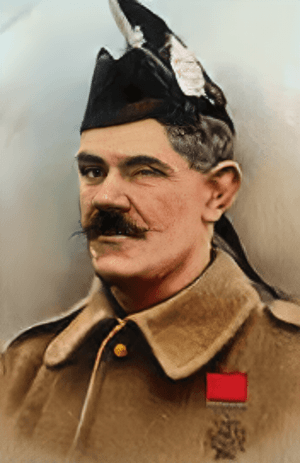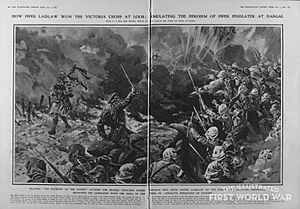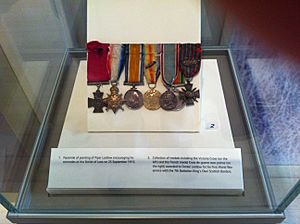Daniel Laidlaw facts for kids
Quick facts for kids
Daniel Logan Laidlaw
|
|
|---|---|
 |
|
| Nickname(s) | The Piper of Loos |
| Born | 26 July 1875 Swinton, Scottish Borders |
| Died | 2 June 1950 (aged 74) Norham, Northumberland |
| Buried |
St Cuthbert's Churchyard, Norham
|
| Allegiance | United Kingdom |
| Service/ |
British Army |
| Years of service | 1896-1912 1914-1919 |
| Rank | Sergeant-Piper |
| Unit | The King's Own Scottish Borderers |
| Battles/wars | World War I |
| Awards | Victoria Cross |
Daniel Logan Laidlaw (born 26 July 1875, died 2 June 1950) was a brave Scottish soldier. He was known as "The Piper of Loos". He earned the Victoria Cross (VC), which is the highest award for bravery in the British and Commonwealth forces. He received it for his amazing actions during the Battle of Loos in the First World War. Only one other piper won a VC during that war.
Contents
Early Life and Becoming a Piper
Daniel Laidlaw was born in Berwickshire, Scotland, on July 26, 1875. He joined the British Army in 1896. He first served in India with the Durham Light Infantry. There, he helped during a serious health crisis in 1898.
Later, he became a piper for the King's Own Scottish Borderers. A piper is a soldier who plays the bagpipes. In 1912, he moved to the army's reserve list. This meant he could be called back to serve if needed.
Bravery in the First World War
When the First World War started, Daniel Laidlaw rejoined the army. This was in September 1914. He was sent to France in February 1915.
In September 1915, Laidlaw was 40 years old. He was a piper in the 7th Battalion of the The King's Own Scottish Borderers. This was during the fierce Battle of Loos.
The Battle of Loos and the Victoria Cross
On September 25, 1915, the soldiers were about to attack German trenches. Heavy bombs and gas had made the British soldiers feel scared and unsure. Piper Laidlaw saw this.
With incredible courage, he climbed onto the trench wall. He walked back and forth, playing his bagpipes loudly. His music helped to inspire his company. They quickly gained their courage back.
His brave example worked immediately. The soldiers rushed out of the trench to attack. Piper Laidlaw kept playing his pipes. He continued until he was wounded.
This amazing act of bravery earned him the Victoria Cross. It is the highest award for courage in the face of the enemy.
Awards and Recognition
King George V personally gave Laidlaw his Victoria Cross. This happened at Buckingham Palace in early 1916. After this, he was promoted twice. He became a Corporal and then a Lance Sergeant by the end of 1917.
In the same year, France gave him the Croix de Guerre. This award is for heroic deeds. He left the army in April 1919.
Life After the War
After the war, Daniel Laidlaw lived in north Northumberland. Even though he was famous for his bravery, he found it hard to find steady work. He was unemployed for long periods.
Just before the Second World War, he became a sub-postmaster. This meant he ran a small post office. During the war, he also served as a head ARP warden. He helped protect people during air raids.
He passed away on June 2, 1950, near Berwick-upon-Tweed. He was buried in St Cuthbert's churchyard in Norham, Northumberland.
His Legacy
In April 1906, Daniel Laidlaw married Georgina Mary Harvie. They had three sons and three daughters.
His grandson, Victor, later gave Daniel Laidlaw's Victoria Cross and other medals to the National Museum of Scotland. You can see them on display there today.
 | Dorothy Vaughan |
 | Charles Henry Turner |
 | Hildrus Poindexter |
 | Henry Cecil McBay |



